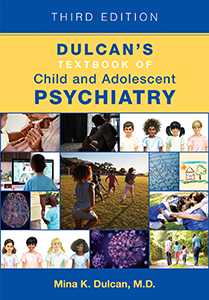Chapter 37.Antipsychotic Medications
Sections
Excerpt
Since their discovery in the 1950s, antipsychotics have become an important pharmacological treatment option for a number of severe mental disorders. In children and adolescents, antipsychotics are increasingly used for both psychotic and nonpsychotic disorders (Olfson et al. 2012). Data from randomized controlled trials (RCTs) indicate that antipsychotics have significantly greater efficacy than placebo for pediatric mania, schizophrenia, and irritability and aggression associated with autism spectrum disorder (ASD), disruptive behavior disorders, and Tourette’s disorder. Because of physiological developmental differences between children and adults, higher antipsychotic doses per kilogram weight are generally required in pediatric patients to achieve similar serum levels and efficacy. More frequent dosing per day may be required in younger children. In addition, pediatric patients appear to be more sensitive than adults to several relevant antipsychotic adverse effects (Correll 2008), mandating careful treatment selection and adverse effect monitoring and management in this vulnerable group of patients.
Access content
To read the fulltext, please use one of the options below to sign in or purchase access.- Personal login
- Institutional Login
- Sign in via OpenAthens
- Register for access
-
Please login/register if you wish to pair your device and check access availability.
Not a subscriber?
PsychiatryOnline subscription options offer access to the DSM-5 library, books, journals, CME, and patient resources. This all-in-one virtual library provides psychiatrists and mental health professionals with key resources for diagnosis, treatment, research, and professional development.
Need more help? PsychiatryOnline Customer Service may be reached by emailing [email protected] or by calling 800-368-5777 (in the U.S.) or 703-907-7322 (outside the U.S.).



